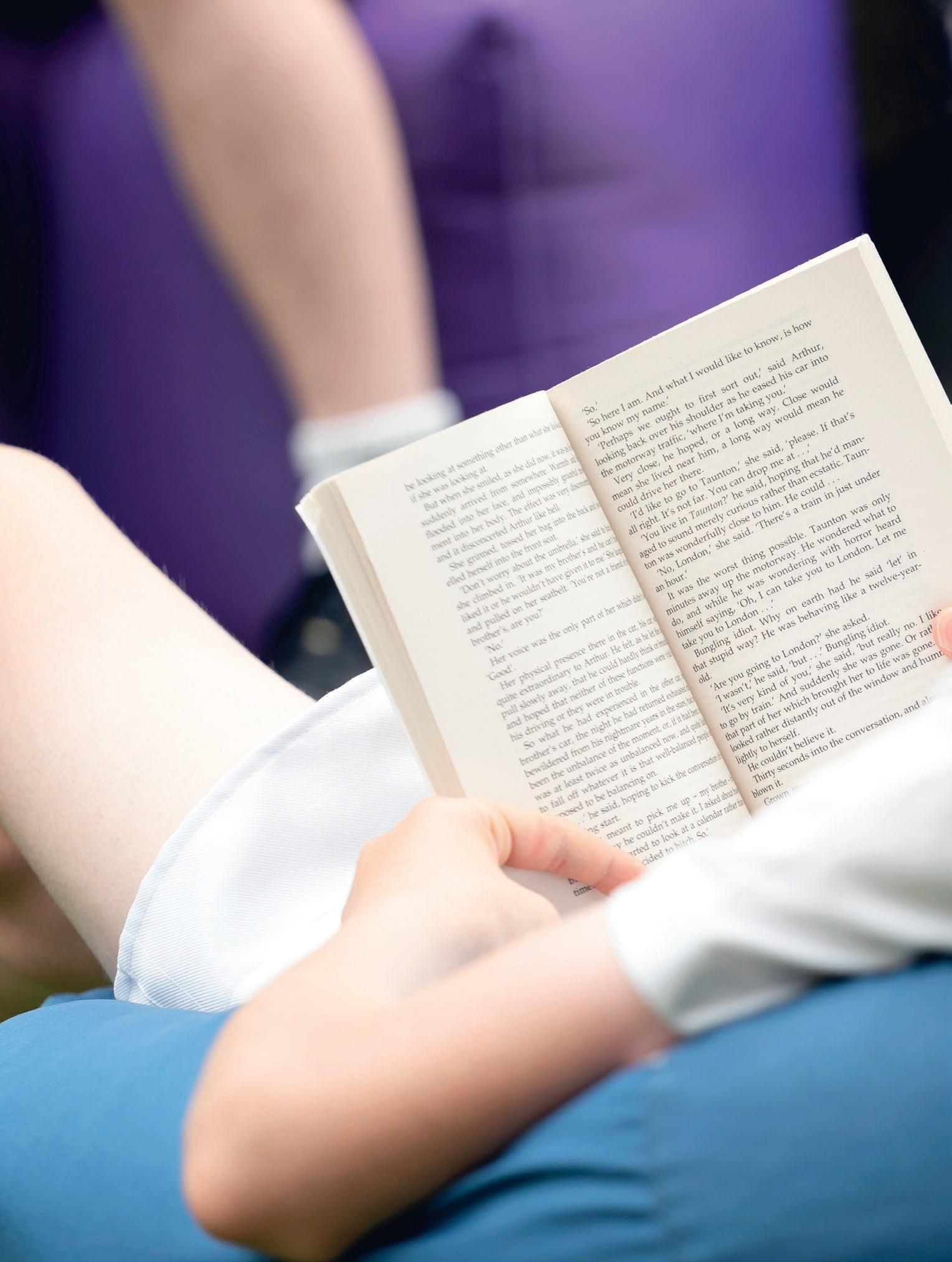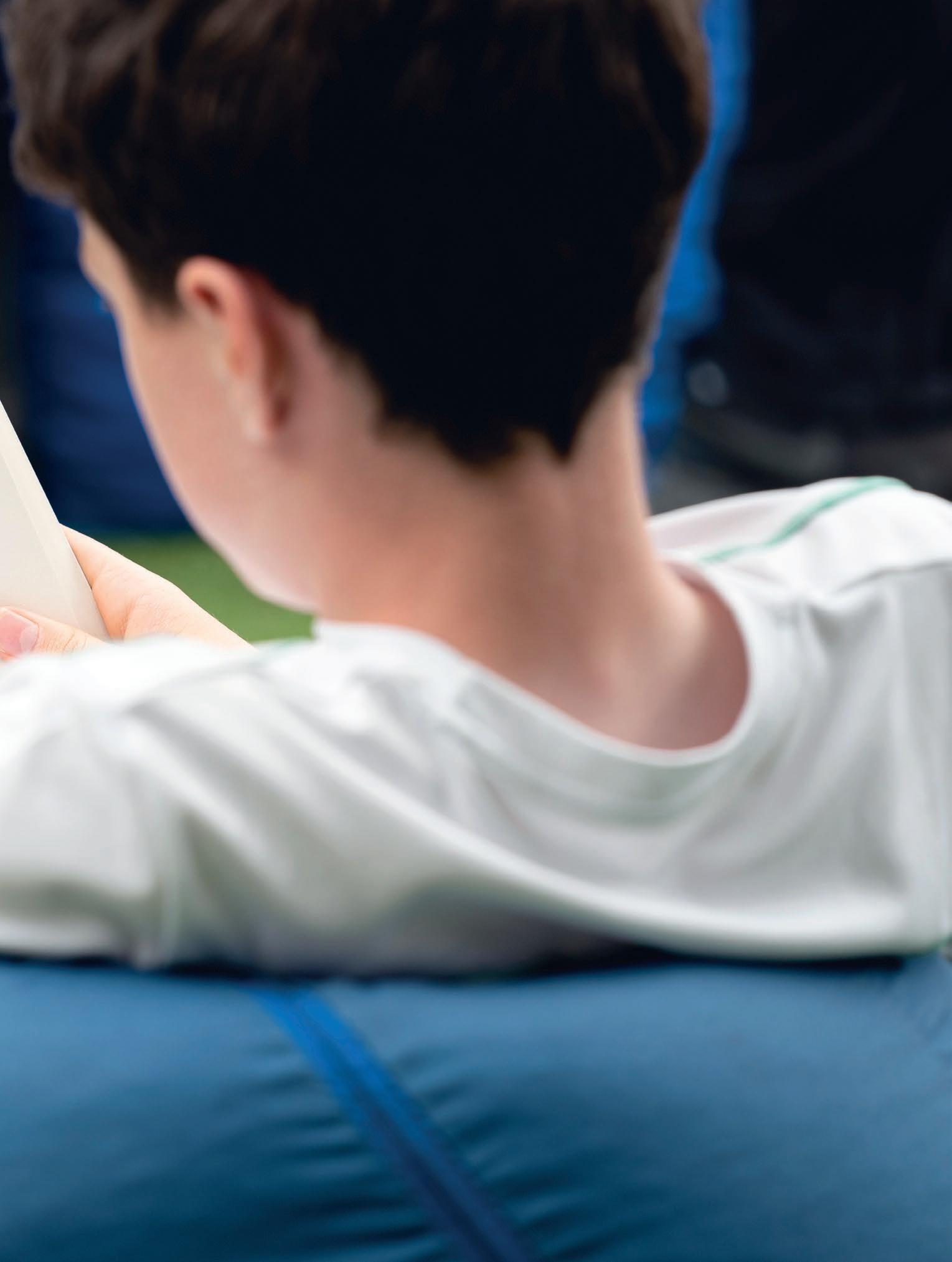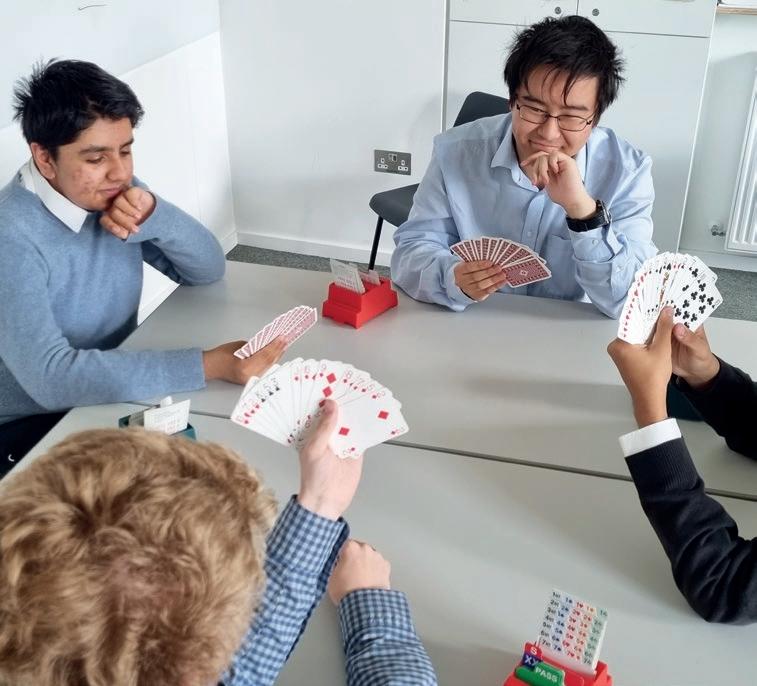
45 minute read
Societies
SOCIETIES RUNNING NEXT YEAR 22-23
AI SOC ASTRONOMY CLUB BIBLE STUDY GROUP BIOLOGY JOURNAL DISCUSSION CLUB BIOMEDSOC BLACK AND WHITE BRIDGE CLUB CHEMISTRY PROBLEM SOLVING CLUB CHESS CLUB CHRISTIAN UNION CLASSICAL SOCIETY CODING PROJECTS SOCIETY COMPSOC COOKERY CLUB CREATIVE WRITING DEBATING SOCIETY DUNGEONS & DRAGONS SOCIETY ECO SOC EDWARD THOMAS SOCIETY ENGINEERING WORKSHOP ENGLISH SOCIETY ENSOC EQUALITIES SOC EQUILIBRIUM (Economics magazine) EUROPEAN YOUTH PARLIAMENT EYP EUROSOC F1SOC FEM SOC FOURTH FORM READING CLUB FRENCH CLUB FUTURESOC GEOGRAPHY SOCIETY GERMAN CLUBS GERMAN THEATRE SOCIETY GREENPOWER FORMULA 24+ HALLEY RESEARCH COMMUNITY HISTORICAL SOCIETY I-SOC (Islamic Society) IMPSOC ISAIAH BERLIN PHILOSOPHY SOCIETY ITALIAN CLUB ITALIAN CLUB J-SOC (Jewish Society) JOHN CHURCHILL SOCIETY JOINT PHILOSOPHY SOCIETY JUNIOR CHEMISTRY PROJECTS CLUB JUNIOR HISTORY SOCIETY JUNIOR PASK SOCIETY JUNIOR PHILOSOPHY SOCIETY JUNIOR PLAYREADING SOCIETY JUNIOR POLITICS AND HISTORY SOCIETY LAW SOCIETY MAGENTA (Creatives magazine) MATHEMATICS SOCIETY MATHS PROBLEM SOLVING METRO MODEL UNITED NATIONS MUSIC SOC MUSIC TECH CLUB PAINT SOC PANDAEMONIUM & AREO PASK SOCIETY (Biology projects) PAUL NASH SOCIETY PAUL’S PIZZA PEGASUS: JUNIOR CLASSICS SOCIETY PHOTOSHOP CLUB POLECON POLEMIC (Humanities magazine) POTSOC PRESTIGE PRIDE SOC (LGBT+) PSYCHSOC QUIZZING SOC REACH SOC ROBOTICS OLYMPIAD ROCK SOC SCIENCE & SOCIETY (STEM Blog) SCIENCE FICTION & FANTASY SOCIETY SENIOR CHEMISTRY PROJECTS CLUB SPANISH CLUB SPECTRUM (LGBT+) SPS FILM SPS SPACE START IT SOCIETY (Entrepreneurship and Business) STOCK & CRYPTO SOC TABLE TOP GAMING SOCIETY TEAM FIREFLY THEATRE FX VECTOR (STEM Magazine) WARHAMMER SOCIETY
BRIDGE
Louis Kirkpatrick
“Bridge over troubled lockdowns”
Bridge Club has faced many challenges over the last two years, struggling under the weight of heavy COVID lockdown restrictions within school. It was especially hard hit as it is, by its nature, a social sport around a small, tightly-packed table. During the 2020-2021 lockdowns, cross-year bridge was completely suspended in school and the club retreated to a localised Lower Eighth club and games online through apps like Bridgebase and RealBridge. Despite this, however, as the world started to open up at the end of 2021 and in 2022, the Bridge club flourished. We have grown to a size which I have never seen in my five years at the school. There is a whole community of young players who are incredibly keen to play, and the room is always abuzz during Friday lunch break where we are regularly able to run four or five tables simultaneously. We compete in an online school league and we have also returned to running pupil-staff matches after school. My greatest challenge as president has been to meet the demand for more Bridge with supply. To paraphrase Herbert Hoover – I have no fears for the future of our club. It is bright with hope. ❚
JOURNAL CLUB
Oliver Milroy-Goulding
If you want to discuss cutting edge research papers in any biological field, you should come to Journal Club. Talking about everything from killing cancer cells to geckos, this is an intellectually demanding society that pushes keen biologists to their limits.
Ynon Weiss recently presented a paper on an intriguing potential new method of cancer treatment. By altering the expression of genes which remove iron from the cells, and treating the cells with iron nanoparticles, the iron content accumulates in the cancer cells, resulting in a form of cell death known as ferroptosis. The treatment ingeniously uses a promoter (the sequence of DNA just upstream of a gene needed in order to express it) which would only be ‘switched on’ in cancer cells, and therefore the treatment has little effect on normal cells, while still killing the cancer cells.
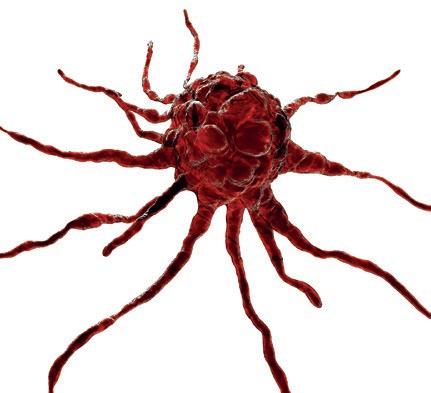
Some interesting questions were asked of Ynon, such as what were the clinical applications of such a procedure and how effective the treatment was actually found to be, and it’s this kind of format that provides an excellent experience of what it is to study science at university and beyond, as well as being truly enjoyable. ❚
BIOMEDSOC
Leo Wen and Oliver Milroy-Goulding
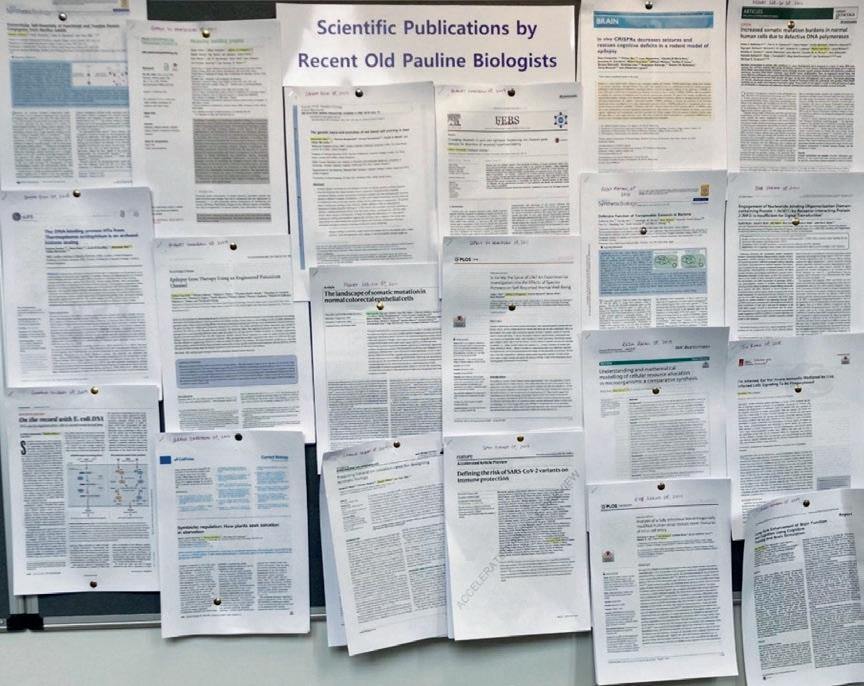
Finally, after two years of virtual talks, BioMedSoc once again hosted talks in Biology Lab 1. Stepping back into the room after so long felt almost surreal: the buzz of excited chatter, the Upper Eighths sitting in the corner huddled together, and the odd Fifth former looking lost. This year, we had an amazing range of speakers, ranging from the consultant neurogastroenterologist Dr Natalia ZarateLopez to Old Pauline Dr Toby Call, the founder of Chronomics Biotech company and many others.
One such talk this year was on liver transplantation and its ethics by Dr Ameet Dhar. He talked about how transplants are an option of last resort, and how liver transplants in particular are mostly preventable. Record consumption of alcohol and rates of type 2 diabetes have increased the number of livers that need replacing, but the supply to meet them is lacking. Only 700 livers are transplanted a year in the UK, but 3000 people die of liver disease. Prioritisation, therefore, needs to occur for the waiting list, leaving doctors and multi-disciplinary teams to make the hard choices about who deserves to live. The overarching theme in choosing recipients is ensuring that the benefits of the transplant outweigh the risks. Patient quality of life is paramount, rather than quantity, so sometimes making the choice not to transplant is the right one. The same logic is behind Do Not Resuscitate orders. Lowering the risks is also key to how doctors decide. Drinking alcohol within 3 months results in instant disqualification, while more relative risk factors, such as age and obesity, are taken into account and patients are required to get into shape in order to increase their survival rate. For someone whose entire career revolves around saving people, having to choose between who to save is impossible, but for transplant specialists such as Dr Dhar these decisions need to be made every day. ❚ What constitutes a faith? At the Christian Union, we think we’ve found a major component of it: fellowship. Throughout the year, the corridor outside the chapel has been thronged with boys, ready to hear a talk from either a returning Old Pauline or another fascinating external speaker. This sense of community extended even into the holidays, with the successful returns in the aftermath of covid of both the Summer and Easter Houseparties: ten and seven day long residential trips on which a great deal of football, hockey and bin cricket is played; four meals a day are provided and eaten; and spiritual discussion is held. Not only did the CU grow in fellowship throughout this year, but also in faith, as some excellent talks were delivered, especially by Rob Stanier, who discussed how to pray, making his point particularly memorable by leading the room in a series of stretches to illustrate the benefits of a consistent prayer life. Special thanks must go to Rev. Knox and the OP Officers, whose dedication allowed us to continue our more than hundred year old tradition of welcome and fellowship. ❚
CHRISTIAN UNION
Jack Davies
CHESS CLUB
Teddy Onslow
Thankfully, this year, chess club was able to return in person, led by Grandmaster John Emms who has revitalised over-the-board chess at St Paul’s. It has been gratifying to see so many chess players in one room once again huddled around a board.
St Paul’s has continued to thrive in inter-school tournaments this year. We won two inter-school team battle competitions, beating 34 of some of the strongest chess schools in the country. The A-team also participated in the National Schools Chess Championships, winning the regional qualifier with all 10 of the St Paul’s team ranked in the top 10 overall. The team continued to defeat Sir Thomas Rich School 9.5-2.5 in the regional quarterfinal, Latymer Upper School 10-2 in the semi-final and Redborne School 3-3 in the final (winning by way of the board-count rule). The A-team will compete in the National final against 19 other qualifying schools later this year.
The St Paul’s chess team has also seen success in the National Problem Solving Competition, where competitors must find unique ways of checkmating in a specified number of moves. The team scored 60/60 in the first two rounds and will compete in the final later this year. Here is a problem from one of the rounds: white must find a move to force a checkmate on the next move.
We thank Dr Shravat for organising and supervising all of our out of school events and providing the St Paul’s community with a variety of opportunities to get stuck into school chess once again. Thank you to GM John Emms for teaching chess club; we are extremely fortunate to have such a strong player guide our chess. ❚ Solution: Nd7
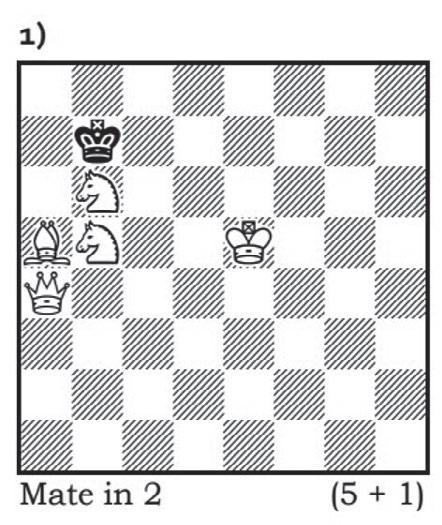
CHEMISTRY PROBLEM SOLVING CLUB
BCBM
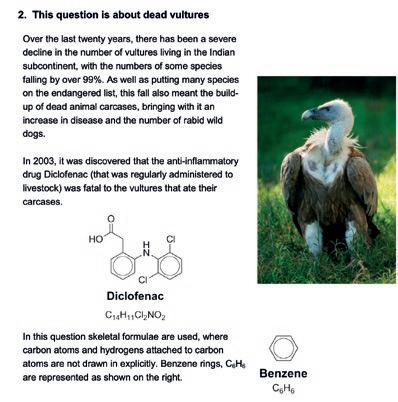
The weekly chemistry problem-solving club had its inaugural session in the Spring term this year and has been going strong ever since. Around twenty Lower Eighth formers have been finding their way through some fiendishly challenging Cambridge Chemistry Challenge problems, often working in threes and fours to tackle some of the more difficult parts of the questions. The CCC papers always draw from chemistry in the news, chemistry in biological systems, or chemistry in technology. So far, the students have looked at questions about the horsemeat scandal, the James Webb telescope, tetraoxygen in sports drinks, and the chemistry of dead vultures, to name just a few examples. “What I enjoy most about chemistry problem solving club is how it brings other STEM subjects into chemistry. For example, recently we derived an expression for the Avogadro constant. This incorporated maths and was something I really enjoyed. Moreover, the sessions push you to apply your knowledge of chemistry to off-specification situations, which is challenging, but satisfying.” Zak Farazi
The club will continue into the Upper Eighth and, as it does, we will start to look at even more challenging Olympiad and University-level problems. Let’s hope the students are ready for the challenge! ❚
CLASSICAL AND ISAIAH BERLIN SOCIETIES
Hari Collins and Jack Davies
Hari
Over four weeks, Dr Duits made an enthusiastic and detailed argument that no one called Jesus, claiming to be or anointed by his followers as the Son of God, existed in first-century Palestine, and I must say I was completely convinced. The accumulation of evidence that the Jesus story was created out of pre-existing Middle Eastern mythology, or in order to fulfil aspects of Jewish prophecy concerning the Messiah, was eventually overwhelming. Thus the Gospel of Mark was, Dr Duits showed, carefully patterned to give it a more interesting literary structure, and to create symbolic parallelisms within the story which could not be expected in account of a real life. The story of the resurrection was also patently a fabrication, given its similarity to many other, obviously fictional, Near Eastern religious myths. Furthermore, the evidence of Tacitus, Seutonius and Josephus as to the existence of Jesus could be discounted; their accounts were written long after the putative life of Jesus, and the name was probably derived from Christian communities rather than independent sources of evidence. In summary, there is no real evidence that Jesus Christ was a historical person, and plenty (albeit mostly circumstantial) to believe that he did not.
Jack
Despite what Hari (and some in the philosophy department) might have you believe, Jesus almost certainly did exist as a historical figure. Although the Gospels may indeed be carefully patenered, such a style of writing is to be expected in a religious text presenting itself as the fulfilment of historic prophecies and is also typical for other, more explicitly historical, texts of the time. The suggestion that the narrative of Jesus is derivative from other so-called ‘dying-rising gods’ can be mostly dismissed on the grounds that there does not, in fact, appear to be any such thing as a ‘dying-rising god’. In addition, the Classical sources are more reliable than suggested by Hari, as Tacitus and Suetonius are both writing in traditions so separate from the Christian one that they can be viewed as independent colaboratory evidence. Despite the arguments presented here, the seminars were a wonderful opportunity to seriously investigate one of the key debates of history, and were run admirably well by Miss Waterfield and Dr Duits, who clearly outlined the main arguments whilst enabling us to reach our own conclusions. ❚
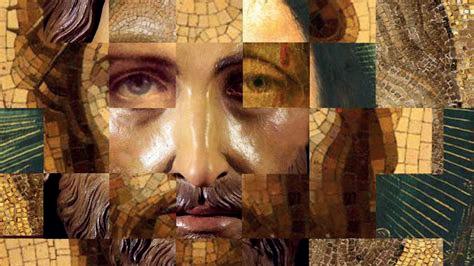
Disclaimer: This article does not necessarily reflect the views of its author, or indeed anyone.
CREATIVE WRITING SOCIETY
Elijah Patterson
Creative Writing Society has had a lot of creative juices flowing this year, covering a whole range of writing forms: from scripts and screenplays, to poetry and short stories. Each week we meet to discuss our creative pursuits: our masterpieces as well as our failures (mainly the latter).
Sometimes we are sent away with a theme for the week, and then return with a piece of writing related to the theme; the most recent of these, in line with Mental Health Week, was the theme of loneliness, where Nabil Jinadu wrote a fantastic, abstract 100 word short story, and Yifei Wang wrote a poignant poem called ‘She Spoke In Poetry’, which told a moving story about autism, and I wrote nothing. We have also looked at peoples’ longer projects for feedback, such as the beginnings of Nabil’s fantasy adventure story ‘World Stage: The Rise of Carolus’, and my own, heavily fragmented, novella ‘The Unicorn Hearse’. I particularly appreciated the feedback on my script ‘The Hog’, that helped me improve the play before I put it on at the school, which has been a very exciting process, and hopefully the first of many. We were also graced with the visit of playwright Tonderai Munyevu, who got us to experiment in storytelling both through both performance and writing. We learnt invaluable lessons about his writing processes and were inspired by his successes.
All in all, we’ve had a very creative year, and what we sometimes lack in quality, we make up for in quantity. And at the end of the day, hopefully, we have all made tremendous improvements in our writing abilities! ❚
DEBATING
Arth Kochhar and Lucas Cadman
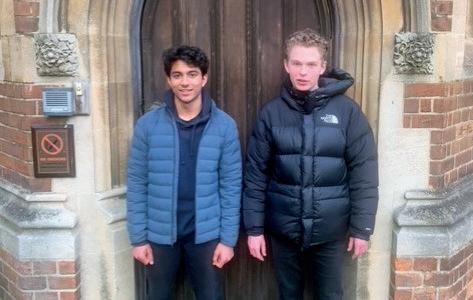
This year Debating Society emerged from COVID with a strong desire to compete and develop our skills both in and out of school. We have held regular debates on key issues with a particular highlight being our debate on whether President Biden was right to withdraw from Afghanistan; this drew huge crowds. Throughout the year the old guard were replenished by a new generation of Fifth Form debaters who developed their skills dramatically. It was particularly impressive to see how they became more confident in their public speaking, learning to fill multiple 5-minute speeches on a motion with well-developed arguments. This was not an easy feat, and we hope they feel proud with how they progressed and are hungry to become better and take part in competitions.
We also saw great success outside of school with strong performances at LSE, Imperial, Harrow, and Oxford Schools debating, as well as junior and senior competitions with Debating For Everyone and Mace. We had one team qualify for the Oxford Schools finals for the first time in years. Sadly, Casper Robertson had to drop out from the finals due to illness, so at the last minute Arth Kochhar stepped in and went with Lucas Cadman to compete. After getting up early for the 6:50 am train to Oxford for four rounds of gruelling debating we achieved St Paul’s best result in six years. It was also our first competition in person since January 2020. Lucas, who only started debating in September, was ranked the highest ranked novice in the competition.
Overall, this year was excellent for Debating Society as we fostered the next generation of top SPS debaters alongside great performances. We are looking forward to next year’s debating as an opportunity to do even better. ❚
ITALIAN SOCIETY: LA MAFIA IN SICILIA
James Sahota
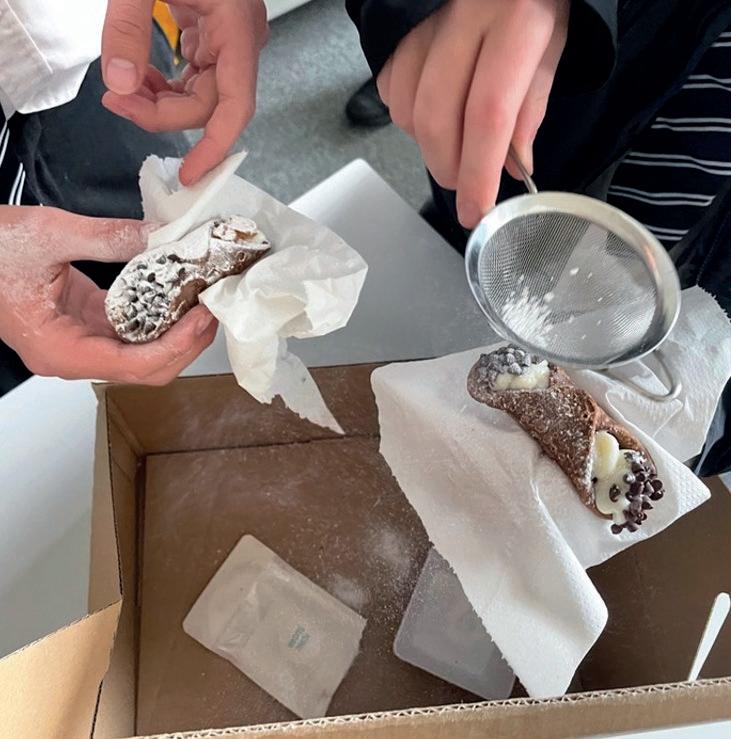
In questo quadrimestre, nella società d’Italiano, noi abbiamo parlato di molti diversi argomenti e della cultura Italiana, soprattutto della Mafia in Sicilia. Negli ultimi incontri della società abbiamo guardato il film “La mafia uccide solo d’estate” e abbiamo parlato di come gli eventi che sono successi nel film sono accaduti realmente a Palermo fra il 1980 e il 1992. Per esempio, il Maxi Processo che era un processo penale contro la mafia siciliana che ha avuto luogo a Palermo e si è svolto in un palazzo di giustizia in stile bunker appositamente costruito all’interno delle mura del carcere dell’Ucciardone. I due giudici Giovanni Falcone e Paolo Borsellino sono stati uccisi dalla mafia, però sono riusciti ad arrivare al loro scopo di punire la mafia per i suoi crimini e saranno sempre ricordati da tutta l’Italia per il loro servizio e sacrificio.
Nell’ultimo incontro della società abbiamo fatto e mangiato dei cannoli siciliani molto buoni. Per finire questo articolo l’unica cosa che posso dire è che dovete assolutamente venire nell’aula 106 all’1:20 di martedì per imparare tutto sulla cultura italiana e anche per mangiare dei cibi strepitosi che rilasciano un tripudio di sapori. ❚
EUROSOC
Varun Vashisht
Enter Eurosoc: SPS’s very own language society rose from the depths of a COVID-suppressed world, and brought joy and inspiration to so many of the school’s linguists. From learning about Kafka with Mr Perrin, talking about how linguistics influences the financial world with an Old Pauline, to going through a journey of (Levi’s life) with Mr Tofts, EuroSoc has hosted a great number of different speakers, who have explored the diverse ways that language, culture and economics are vastly intertwined. As a society whose ambition is to grow a community more aware of different cultures, languages, and traditions, we believe that this year has proved to be one of the most intellectually exciting of them all.
One of the most popular weeks has proved to be the game week, bringing pupils from all different years and staff with different expertise together to learn about interesting words, guess the country from which certain pieces of architecture come, and, of course, speaking different languages while playing Connect4! Languages have a lot to offer in the world of literature, finance, and even medicine, and over the past year, EuroSoc is proud that it has shown the significance of learning languages to the school community. ❚
FEMSOC
Alex Henke
When my sister suggested that I start a Feminist Society back in 2020, I laughed nervously and said that I didn’t have time. But the real reason I didn’t commit was that I was scared of social ridicule. Being a feminist was something that I would proudly say to my family, but mumble to my friends.
Everyone’s Invited changed everything. For the first time, I heard first-hand accounts of misogyny endemic in society and knew I had to do something: I couldn’t look my sisters in the eye. I rounded up the first four members of what would become the committee, spoke to Miss Cloete, and FemSoc was born.
Owing to Miss Cloete and Mr Anthony’s diligence, we formalised the society as one part of the Equality Group and had our first meeting in September, where we invited the High Master to speak on her experiences as a working mother. Coming out of the meeting, I felt inspired. This group of open-minded, accepting individuals discussing gender issues was something I had never experienced before. Since then, we’ve put on tri-weekly meetings on a range of topics such as Feminism in Literature, the Texas Abortion Bill, and the Gender Pay Gap. We also supported themed days and weeks around school: notably for the International Day for the Elimination of Violence against Women and Girls in November as well International Women’s Day in March. I tried out my moderating skills at joint meetings with SPGS on the topics of porn and raunch culture, as well as gender bias in sports and education. Throughout the year the committee and the teachers helping us have been fantastic in fulfilling our vision for the society, and I firmly believe the school community has improved in its approach. But even in my very last days as a St Paul’s student, I’ve unfortunately been reminded of the importance of this society both for the future of the school and for society. There are people the world over who are sadly still entrenched in their ignorance and there are also those who are struggling to get past social insecurities – not knowing how to hold their friends accountable or to stop being a bystander. But this speaks to the importance of FemSoc and keeping the conversation alive. Looking at how FemSoc has grown in the last year, I’m sure that our community can lead by example and continue to evolve into an entirely accepting community where we hold ourselves, and each other, accountable and act as good role models for our younger peers. ❚

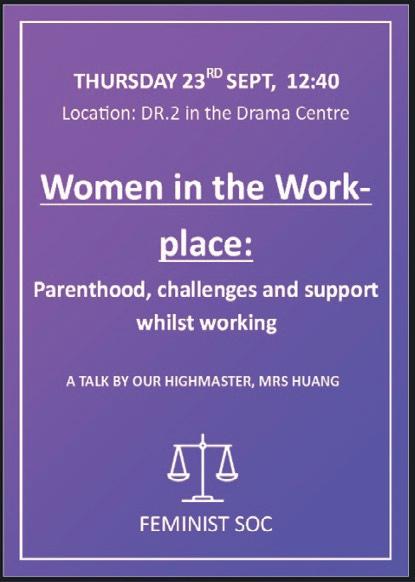
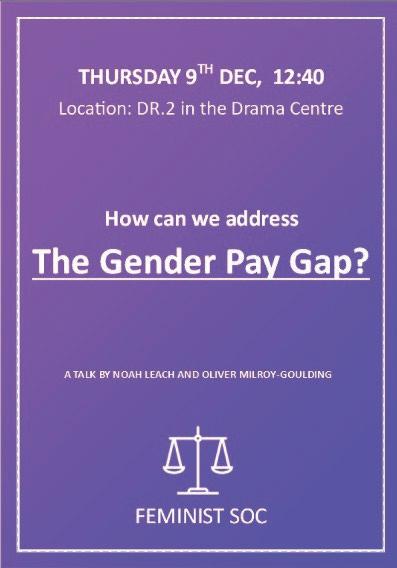
HALLEY SOCIETY
Nick Land
This year was an exciting time for Halley Society as in-school collaborative research could begin again. We have had teams from across the year groups researching topics such as the structure of dragonfly wings, the properties of superalloys, and the chemical structures behind odours and smells. This work is primarily done using the School’s research-grade Scanning Electron Microscope (SEM) which can magnify up to thirty thousand times, allowing one to see extremely fine details of the structure of any sample.
We have also had numerous external speakers discussing topics such as optoelectronic olfaction (a computerised nose), neutrino oscillations, and the standard model of physics, and were honoured to have former OP Professor Haldane share with us his inspiring journey to a Physics Nobel Prize. A highlight was the International Day of Women and Girls in Science which our society celebrated for the first time and in which we included the science societies at SPGS. We were fortunate to welcome Professor Sharon Peacock, a Cambridge Microbiologist whose work with the UK government was crucial in sequencing the SARS-CoV-2 Virus. Dubbed the world’s top COVIDvariant hunter, she gave a fascinating presentation about her work fighting the virus followed by an interview about the challenges she has faced as a woman in a male-dominated field throughout her education and career. All of our talks were shared via zoom with our partner schools in line with the school’s commitment to our wider community. ❚
JEWISH ASSEMBLY
Jacob Leigh
Assemblies have been on a weekly basis with a solid core of pupils in the Fourth and Fifth form attending every week, full of exuberance and interest. The year kicked off with Rosh Hashanah and Yom Kippur. Joshua Brecker spoke about Jews and Sports, Jacob Leigh on The Dreyfus Affair, Louis Ezra on the Munich Olympics Terror Attacks, and Joe Katzenellenbogen about Lucian Freud. Ms Mervis spoke on Benjamin Disraeli and Yiddish, and Dr Newton on Jews in the Navy and Chassidim.
It has been great to see younger boys leading assemblies. Zachary Joseph and Zach Tydeman in Fifth Form gave an insight into the influence of Jews in Hollywood. Misha Zubarev in Fourth Form gave a thought-provoking talk about Jews in his native Ukraine. For someone so young to talk about an issue so personal was inspiring.
We commemorated Holocaust Memorial Day on the 27th January, remembering the 6 million Jews who were victims of Nazi persecution. We created a video to share experiences of relatives during the Holocaust, as well as explaining the history behind it and why we remember it. The video, watched by the whole of the senior school, was personal and moving.
Gideon Falter OP gave a talk as part of the Topical Tuesday series on his work as Chairman of Campaign Against Antisemitism, explaining his role in helping to target casual antisemitism and the steps needed to help eradicate it from our society: it was inspiring to hear his ideas. ❚
GEOGSOC
GeogSoc team
GeogSoc has hosted a range of talks which explored the ins and outs of contemporary geopolitics.
One of these was a riveting talk on the geopolitics of the Nile, a river that acts as a life-giver to the 11 countries it passes through – especially Egypt, which relies almost entirely upon it for its water. With the construction of the Grand Ethiopian Renaissance Dam on the stretch of the Nile through Ethiopia, Egypt will certainly lack supply downstream as it is hoarded in Ethiopia; nevertheless, they are powerless to stop this piece of innovation that is set to bring electricity to millions of Ethiopia’s citizens.
Another issue discussed was the fallout from the Western withdrawal from Afghanistan last summer. ‘Afghanistan: The Graveyard of Empires’ was an illuminating presentation by Nat Dembo Shah in the wake of the Taliban retaking Afghanistan, detailing the two main factors that make Afghanistan such a difficult territory to conquer. On the
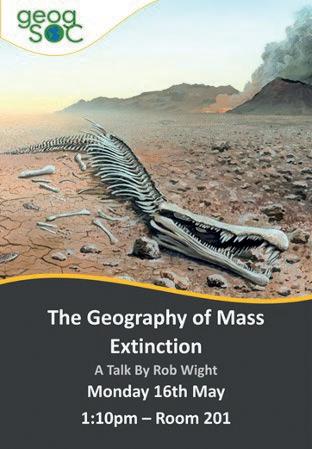
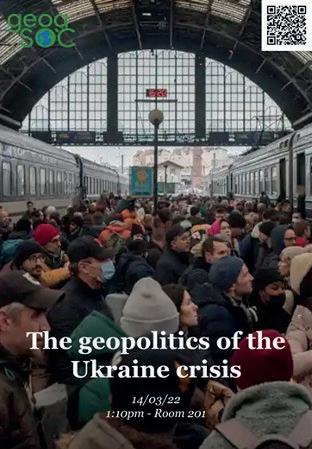
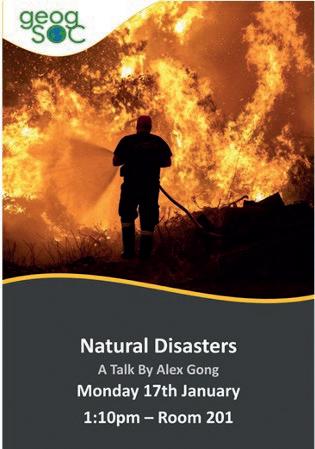
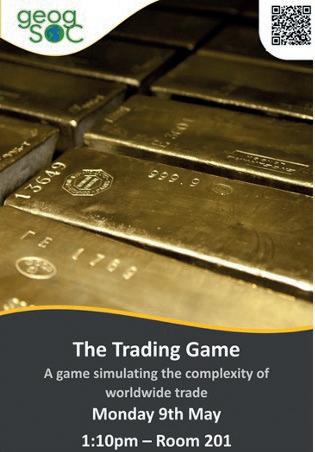
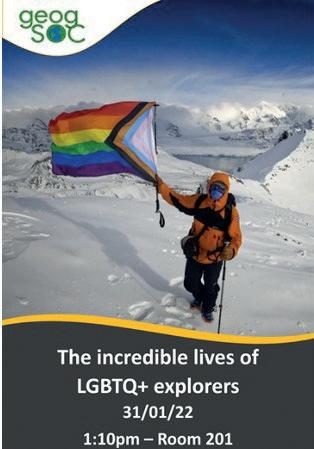
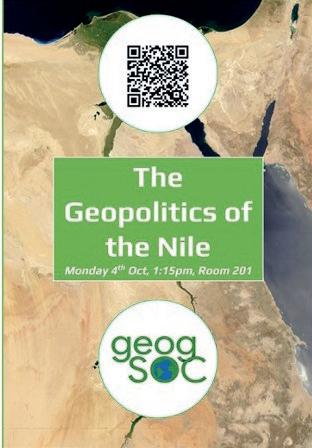
topic of invasions, we also looked at the knock-on impacts of the Russian invasion of Ukraine, especially on migration. Migration is a theme of both the GCSE and A2 curriculum, so it was really fascinating to go beyond the specification and delve a little deeper into such a current example.
Other standout talks this past year included ‘Snowball and Hothouse Earth: Paleoclimate Changes and What We Can Learn From Them’, a captivating presentation by Kaan Akyol on the climate dangers facing our fragile planet and the action we can take to prevent a climate catastrophe, as well as an insight into ‘The incredible lives of LGBTQ+ explorers’, a talk that focused on six members of the LGBTQ+ community who have completed incredible geographical feats. A separate highlight was Mr Poynter’s talk on the geography of surfing. Who knew that so many hours of research and poring over OS maps was necessary to find the geographically perfect location to surf? If the relatively intellectual appearance of these talks doesn’t float your boat, don’t worry, because there is something for everyone at GeogSoc. This year, we have hosted several interactive events, such as quizzes, Geoguesser, and other geography games. The best attended was The Trading Game, a simulation that aims to demonstrate the unfair nature of global allocation of resources, and the disadvantages that this puts some countries at when they try to develop. ❚
HUMBOLDT BLOG
Nat Dembo Shah
Below is an excerpt from GeogSoc’s publication, the Humboldt Blog, entitled ‘Making Carbon Capture Cost-Effective’.
A group of start up companies have begun to convert captured carbon into sellable products, thus making the process more cost effective. The goods include vodka, diamonds, sports wear, carbon neutral jet fuel, and even food.
One of the major companies involved, Twelve, has received $57 million in funding. It has managed to conduct this conversion process using water, renewable electricity, and an electrolyser, without emitting the normally associated harmful gases. The electrolyser initially converts the carbon dioxide in the air into synthesis gas, a mix of carbon monoxide and hydrogen, a product from which many different uses can be created. In tandem with the US air force, Twelve has found a way to turn the synthesis gas into the world’s first carbon neutral, fossil-free jet fuel, and is also working with Mercedes-Benz on making car interiors. These products would normally be derived from the fractional distillation of crude oil, therefore removing the need to drill for this finite resource.
However, this sector is still emerging. It has much potential; a study by the University of Michigan estimates that the carbon capture sector has the potential to reduce worldwide carbon emissions by over 10% and there are 350 start ups in the sector, attracting a combined total of $550 million in investment. ❚
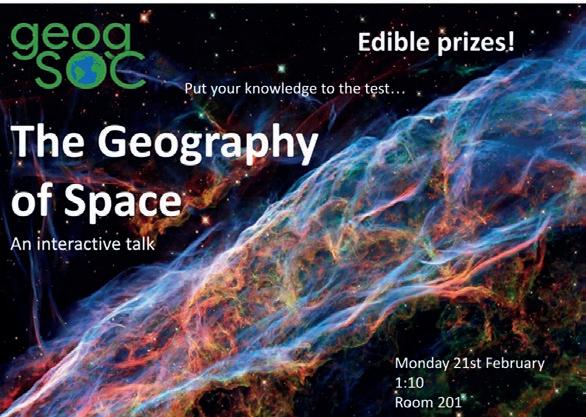
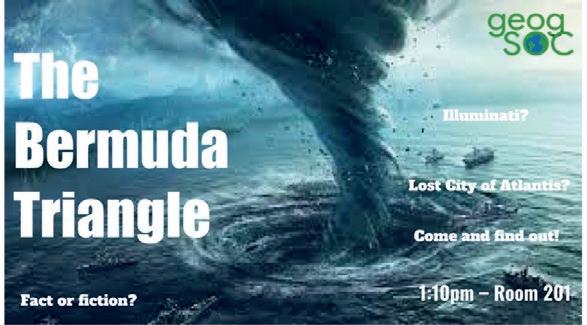
JUNIOR HISTORY SOCIETY
Aidan Wong and Angus Roberts
Every Monday afternoon, a group of Paulines, guided by Ms Milanova, unravel the great wonders of history. Be it a discussion on France’s (rather violent) national anthem or a talk on Ethiopia, there is always something new to be discovered: throughout the year, we have journeyed into every corner of the world, travelled from the prehistoric to the postmodern, and explored all aspects of history.
More recently Ms Milanova has been giving talks on events that happened in or around the Cold War, often at the request of pupils. Many presentations were also given by pupils, such as one by Aidan Wong on the Republican Era in China. Starting in 1912 with the fall of the Qing Empire, it was plagued by warlordism, civil war, and war with the Japanese, ultimately ending in 1949 after the Chinese Civil War and the proclamation of the PRC. Although not generally taught at SPS, this period is extremely important in understanding how China became the way it is and how it transitioned from an empire to a communist state. From a cultural point of view, this brief period of freedom and republicanism also allowed culture, art, and international trade to thrive like never before.
Indeed, culture was a theme throughout many of our talks and discussions. We investigated various aspects of cultural history from movies to the Olympics: one which sparked particular interest was national anthems. The vast range of (often rather strange) anthems were not only amusing and interesting but also revealed a lot about different countries’ values, aspirations, and what they were proud of; many of these also expressed the beauty of their country’s landscapes and landmarks. ❚
THE ST PAUL’S HISTORY REVIEW

The St Paul’s History Review is a new venture from the History department – a student-published magazine that provides a forum for independent historical writing at St Paul’s.
This year’s theme was cultural history. Articles not only explored fascinating aspects of everyday cultural history, such as music, food and theatre, but also grappled with more contentious questions, such as the origins of enduring cultural splits in reunified Germany and a consideration of the play that sparked the Chinese Cultural Revolution. The theme of cultural history allowed for discussion of abstract concepts such as the idea of nationhood and nationalism. The analysis in the articles even extended to the theoretical underpinnings of historical thought, with discussions of the Marxist view of history and Max Weber’s rejection of historical materialism. All of the articles in the magazine contribute in an important way to our understanding of cultural history as a field of study. Taken collectively, they showcase Pauline scholarship at its finest. The successful launch of this new publication was due in large part to the efforts of the editorial team – Nicholas Martin, Nathan Anton, Noah Leach, Edward Dawson and Harry Mugisha. ❚
PRIDE SOC
Felix O’Brien
In his military treatise The Art of War, Sun Tzu stated that ‘in the midst of chaos, there is also opportunity.’ Well, this has certainly been a mildly chaotic year thus far, but with the relaxing of COVID restrictions has come the ability to fill out DR.2 for PrideSoc on Thursdays to hear talks from students, teachers, and outside-speakers alike. Events have ranged from a talk by Teddy Onslow and Thomas Halle on the usefulness of labels, to a talk on the history of the pride flag by Miss Douglass, to an evening in discussion with the Reverend Richard Coles himself – PrideSoc has certainly made the most of its tri-weekly slots this year. We also have definitely enjoyed the opportunity presented in our new role as a member of the Equality Societies group. To all involved, I think that this engagement has helped highlight the importance of intersectionality at St Paul’s – an intersectionality developed during LGBTQ+ History Week, during which a record twelve talks were held by ten other societies in collaboration with PrideSoc. These talks covered a lot of ground, from LGBTQ+ inclusivity in Formula 1, to a screening of visionary filmmaker Pedro Almodóvar’s Elisa & Marcela. We’d like to thank all those involved in helping put on such a great range of talks so far this year. ❚
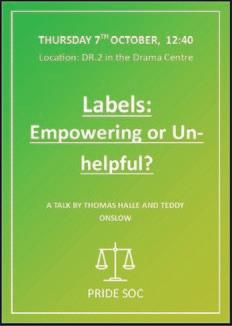

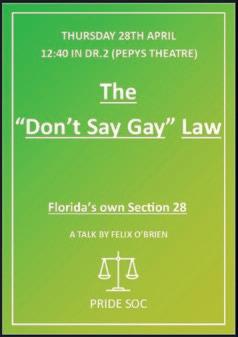
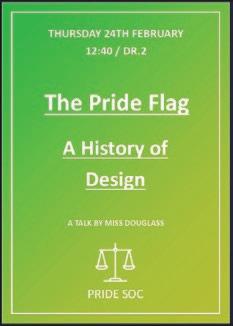
REACH SOC
Harishan Ganeshan
Last year’s BAME Society made a return as the new Race, Ethnicity And Cultural Heritage Society (REACH), with a name highlighting the importance of all forms of diversity to be recognised.
With the death of George Floyd and the reignition of the BLM movement fresh in the minds of all, talks were given by students regarding today’s most serious and prominent racial issues and movements, covering topics from the extent to which civil rights protests had achieved true change in society, to the impact that famous black figures have made to help move society forward, allowing more people of colour to take part in what was previously thought inaccessible to them. Each talk has been followed by student-led discussions on the topic, sharing individual opinions and insights. A highlight of the year was historian and writer David Olusoga OBE and his discourse of Black British history. Alongside the topic of BLM, other topics discussed include the impact of climate change on ethnic minorities. ❚
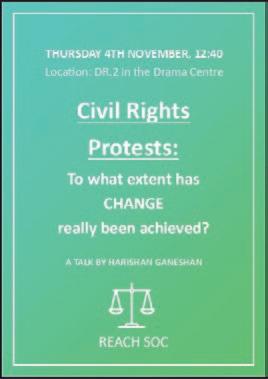
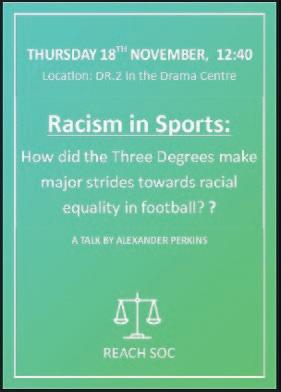
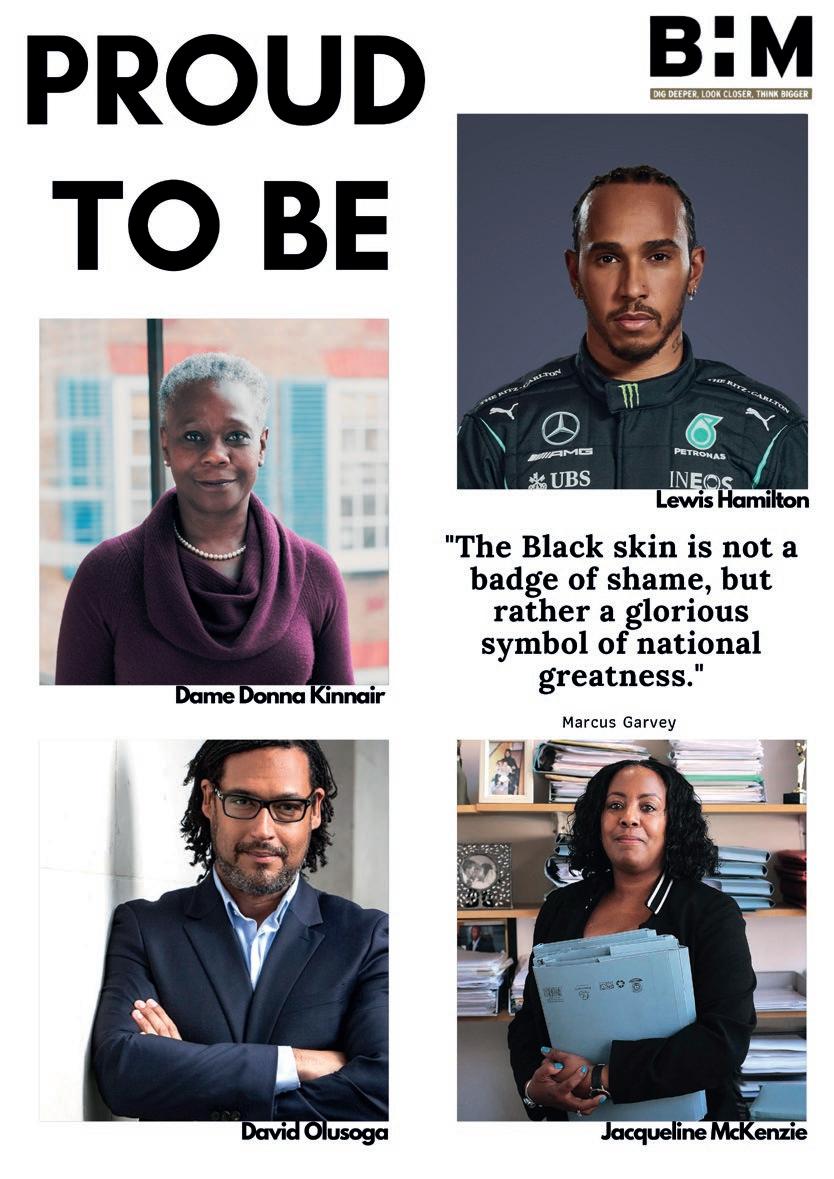
SCIENCE FICTION AND FANTASY SOCIETY
Aidan Wong and Angus Roberts
Among a multitude of discussions of Star Wars and recent films, Science Fiction and Fantasy Society was last term treated to a talk by Charlie Shaw on the music of the loosely-historical pirate-themed video game Sea of Thieves.
The topic itself drew many new audience members, but nothing was compromised for their sake: what followed was a deep and insightful tour through what was more or less proven to be a work of art. From developer and composer interviews, to the use of audio throughout the game to different effects, we learned how music can be thoughtfully applied to enhance an interactive experience.
Most simply: music could accentuate encounters and plot points, with stings and short melodies. This becomes important when notable areas and larger encounters are given themes, which the player will quickly learn to recognize. From there, these themes are interwoven with new music to signify connections between them, which allows the game to subtly hint at story elements, which the player may or may not pick up on. Music is also a core multiplayer mechanic with multiple instruments available to the player. These can be used with other players in multiplayer, each to play their own part in one of many songs.
Overall, this was a comprehensive insight into an often-unappreciated area of fantasy gaming, showcasing the society’s interest in a wide range of topics and different media as well as more “traditional” SFF fare! ❚
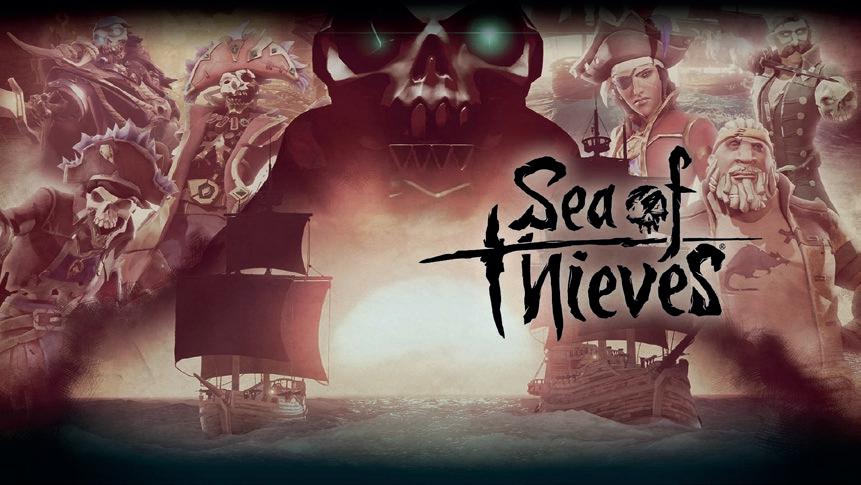
ECOSOC
EcoSoc Team
The aim of EcoSoc continues to be to translate global environmental challenges into school-based initiatives through our promotional posters, weekly blog, and interactive events. As the problems of climate change become more pronounced each year, we believe that it has become even more important for students like ourselves to be aware of the adjustments we can make to our daily lives, as well as what the school as a whole entity can do.
This year, positions on the EcoSoc committee were opened to all yeargroups, allowing keen students to present ideas on the environmental footprint of the school. The weekly blogs have counterbalanced the sidelining of environmental news in the media, with enticing articles on such topics as the ‘Carbon Footprint of Food Waste’, ‘What are the COP conferences and what have they achieved?’, and ‘Sustainability in Art’.
EcoSoc has hosted open and intuitive talks and activities every fortnight. We have been incredibly fortunate to have heard from inspirational speakers such as: Green Party peer Natalie Bennett; founder of ‘Action for Justice’ Richard Lord; founder of sustainable fashion brand ‘EcoAlf’ Javier Goyeneche; and many others. Furthermore, we have continuously enjoyed the impressive speeches hosted by our own peers on subjects such as: ‘Ocean Pollution’, ‘The Imbalanced Effects of Climate Change’, and ‘Strategies for a Natural Cooling Effect’. ❚
PAINT SOC
After a successful trial run during the pandemic, Paint Soc was launched this year to give pupils the opportunity to paint at lunchtime.
Any pupil awash with artistic energy, drawn to art, or simply fancying a brush with creativity was invited to join. The society was open to all year groups and all levels of skill: from total beginners to A Level art students.
From the start, we had a strong showing from Fifth Form pupils. Regulars such as Henry Smith, Thomas Hill, Aidan Malhotra, and Aarush Ranjan helped to create a convivial yet focused atmosphere. Christian Bulmer has also been a valued presence. Deciding to learn from the best, we attempted a Turner mountainscape, details from Nash’s Menin Road, and David Hockney’s A Bigger Splash amongst others. The group also learned a lot from veteran Director of Art Mr Grant’s tuition.
As we entered the Summer Term, the society moved outdoors and invited pupils to make the most of our Thamesside location and paint the river. All in all, this was a successful first year for a society that will hopefully go from strength to strength. ❚
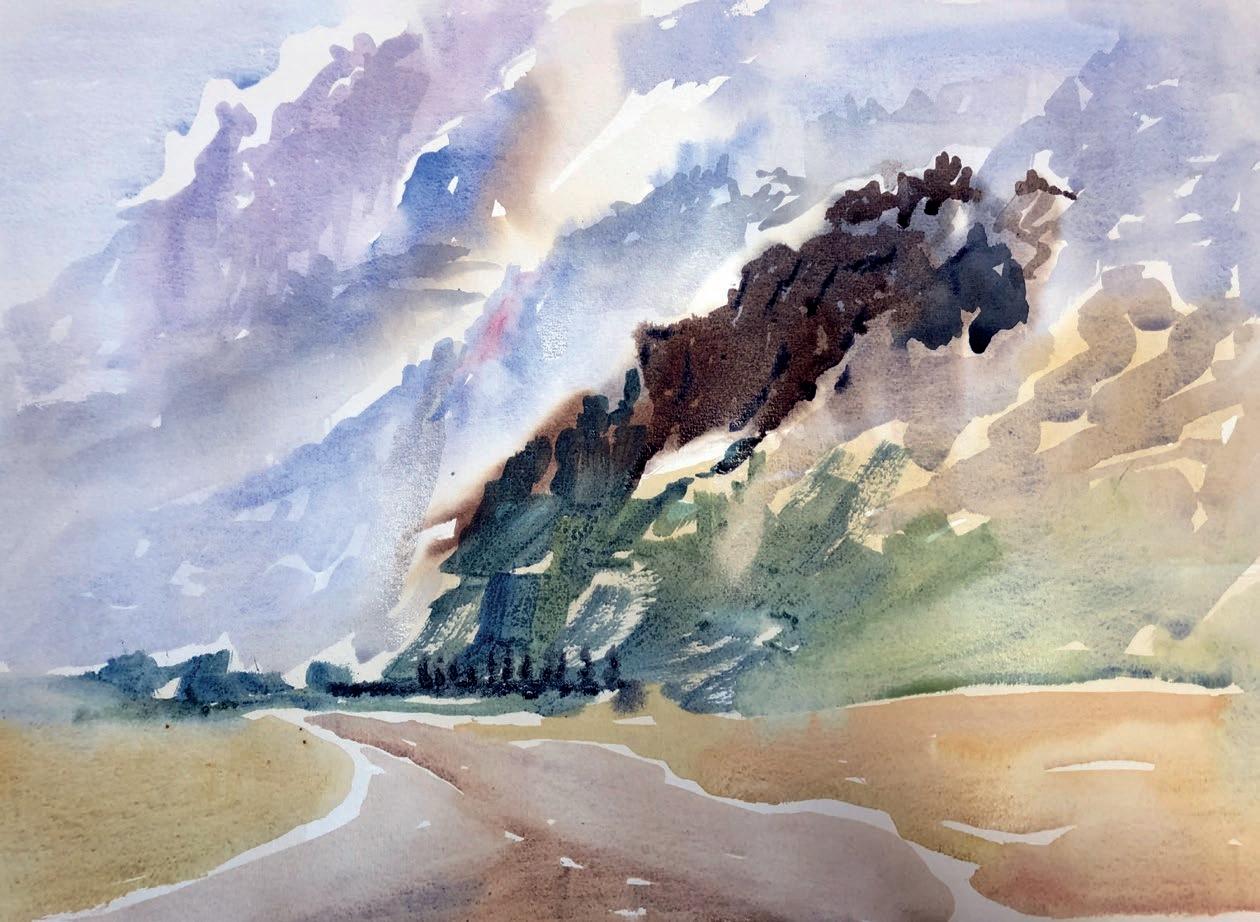
PSYCHOLOGY SOCIETY
Michael Carney
Psychology is an integral part of education, yet it often flies under the radar at St Paul’s. The goal of PsychSoc has been to showcase the interesting and exciting elements of psychology, as well as to provide a useful insight into a potential future career in this field. Despite only starting at the end of the spring term, we have had talks about our unconscious decisionmaking and how it affects our implicit biases and consumer choices, psychopathy and sociopathy, depictions of memory disorders in science fiction, and the effects of language on how we think. Mr Smith, who used to teach a general studies course on psychology, gave a brilliant talk that explored many areas of psychology such as illusions and the failings of our memory and imagery. He offered a mind map of books that explore behavioural economics, clinical psychology, personal motivation and more, such as Daniel Kahneman’s Thinking, Fast and Slow. We are also carrying out an experiment within the school that will aim to prove a psychological phenomenon: the bandwagon effect.
Moving forward, we are hoping to go on a day trip to a museum of psychology and continue learning about everything from mental health awareness to evolutionary psychology and what to expect from further education and a career in Psychology. ❚
PEGASUS
Sam Christie and Shekhu Pillai
Recently, we have travelled back in time to the end of the siege of Troy in the form of a game called Dungeons and Dragons. But, you may be asking, why not simply attend DnD society at lunchtimes instead? Well, our project has been to make it as accurate as possible to the time, and in doing so having modified the accepted game rules to suit our Escape From Troy. However, before we had even set out on this glorious journey, we braved our way through weeks of rigorous planning to achieve the highest possible level of immersion: reading extracts of Virgil’s Aeneid; conducting research into the Trojans; and sourcing maps of the area around Troy.
With Mr Carter as DM, we began the frightening flight to freedom in an abandoned barracks. From here we wandered the streets until we came across two Greek soldiers. With no weapons ourselves save a bent rusty sword, we used the environment to our advantage, pulling a run-down balcony on top of them. Next we came across an old, slimy fountain, with a body of Trojan stuffed down the pipe. Naturally we gave the Trojan a ceremonial burial, with the help of the priest, Orawnatos, and also found a small effigy of Artemis, to which we sacrificed a rat. In response, a partridge, the holy bird of Artemis, led us down a side alley. A few members of our party attempted to attack the bird, but, failing, only caused a small amount of divine disdain in the form of thunder and lightning, and the partridge led us to the palace. There were the living chambers of Hector and his wife Andromache, with the crib of their son Astyanax. Meanwhile, the seer of our party had gone into a trance. From this, and a letter discovered by yours truly, we discovered that the towers of the battlements could be easily knocked down. Accordingly we headed up the stairs to the battlements, looking over the violated city of Troy and the ongoing fighting. Suddenly, we were taken aback by the appearance of two ladders at the brink of the narrow walkway: Greeks incoming! After all our javelins missed, we were forced to engage in hand-to-hand combat. Orawnatos heroically pushed one of the pair clean off the battlements to his grisly death below. Seeing his comrade’s death, the second Greek attacked ferociously. As we were unable to overpower him, Strudelos of our party used a burlap sack he had collected earlier to blind the attacker, and while he held down the struggling Greek we shoved him to the same fate as his companion. And thus, with the knowledge of the towers’ instability, and our newfound weapons and armour, we valiantly strode to aid our Trojan friends under the tower.
Wish us luck, and perhaps we might see you for the next instalment! ❚
PAUL’S PIZZA
Benedict Harrison
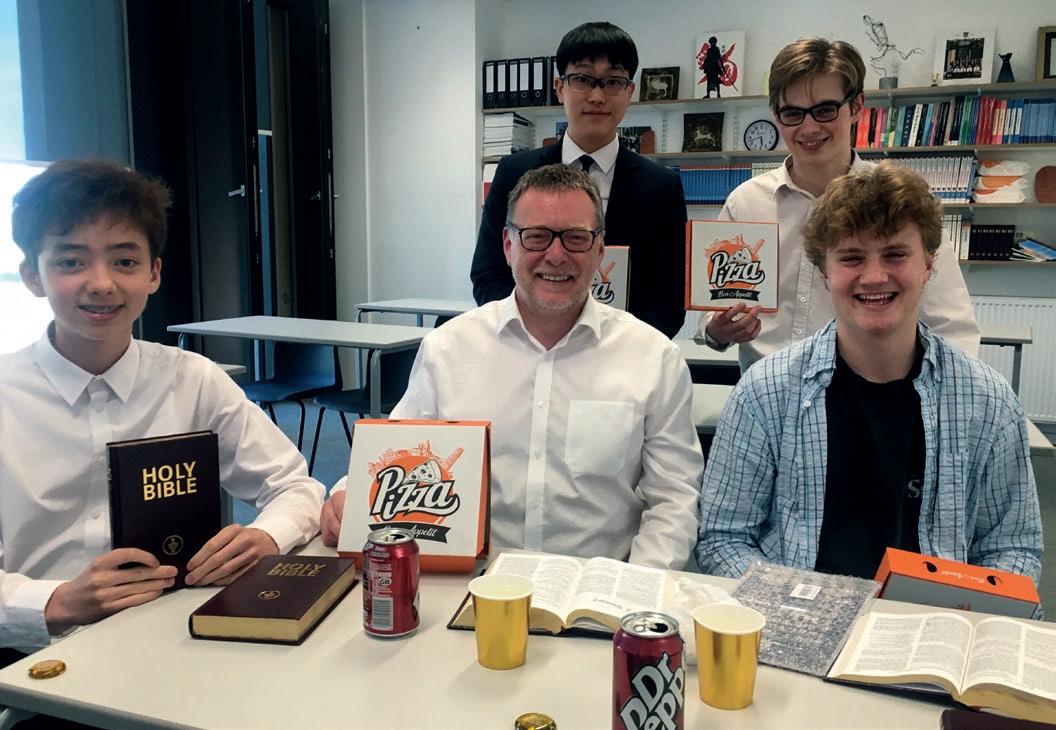
I can do all things through Christ who strengthens me.
Philippians 4.13
Paul’s Pizza consists of two things: eating pizza and chatting. Oh wait! Paul’s Pizza consists of three things: eating pizza, chatting AND the Bible. Each Monday afternoon, the fun and fellowship which all of us enjoy at Paul’s Pizza sets us up perfectly for the week – and a week without Paul’s Pizza truly does not feel like much of a week at all.
However, I must mention a few caveats about Paul’s Pizza. Actually just one caveat… Benedict Harrison. Benny’s frequent lack of organisation has caused a pall to fall over the troops as he often turns up 30 minutes after 4.15pm with the pizzas. While he blames this on being a socialite, unable to get out of conversations (particularly with teachers) before 4pm, the group know this can be blamed on both his love of Common Room pool.
Now, onto the best bits! From Elijah’s stage smile to Dr Baxter’s stories about his upbringing and random people, Paul’s Pizza has the most bizarre things to offer out of all the St Paul’s societies. James’ hatred of the game of Fives and Dr Baxter’s love of Mushroom and Ham Pizza have all been exposed to the world, and hopefully soon the group can understand the wonderful mind of Elijah Patterson. For me, the best thing has been the fellowship. Discussion about prayer and Bible passages but also the classic game of ‘Bible Races’ have all been mainstays. Having a space to discuss problems, laugh, and share with one another, and being able to rely upon each other for support, are the greatest things about Paul’s Pizza. I have truly loved my time as a part of the group and hope Dr. Baxter can continue to grow it. So here’s to Reuben Jones, James Williams, Elijah Patterson, Luca Tresigne, and Dr. Baxter – the mainstays of the group – and also to Jack Davies, Joachim Sciamma, Seb Jones, and Sam Radcliffe who have all enjoyed cameos this year. This is a true hidden gem and I hope pupils reading this can go give it a go and see how much joy it can bring. ❚
Corinthians 16.13
AFRICAN CARIBBEAN SOCIETY
Key highlights for us this year include:
1. The Signing of the ACS Charter. Signed by the 12 Inaugural members of ACS (from SPS and SPGS), the charter declares what values and beliefs ACS stands for. Its entrance into the archives in the Library confirmed the founding of the society, the first of its kind at St Paul’s.
2. The “Taking the Knee” Workshop in partnership with Brentford FC. In the spring term ACS partnered with the football department to host a “taking the knee” workshop, featuring Brentford club ambassador Marcus Gayle and BBC young reporter of the year Salma Mahamud, in a number of talks, focused primarily on SPJ with the objective of raising awareness about racism and discrimination in sports. ACS members and representatives of the 1st XI then gave assemblies to all year groups in the senior school, detailing the general contents and messages of the talk.
3. ACS trip. In March, the SPS and SPGS branches of ACS went to see the “Life
Between Islands” exhibition at the Tate Britain. There we enjoyed a talk from the artist Blue Curry whose work was featured in the exhibition, who gave us useful insight into his work which focused on the tourist fixation of the “exotic” nature of the Caribbean, rather than seeing it as a real place where people live and have their own culture.
Our aims for the society next year are: a) to expand the society’s membership especially in the younger year groups; b) to run multiple events during black history month; and c) to take a trip to Trinidad and Tobago during carnival season. ❚
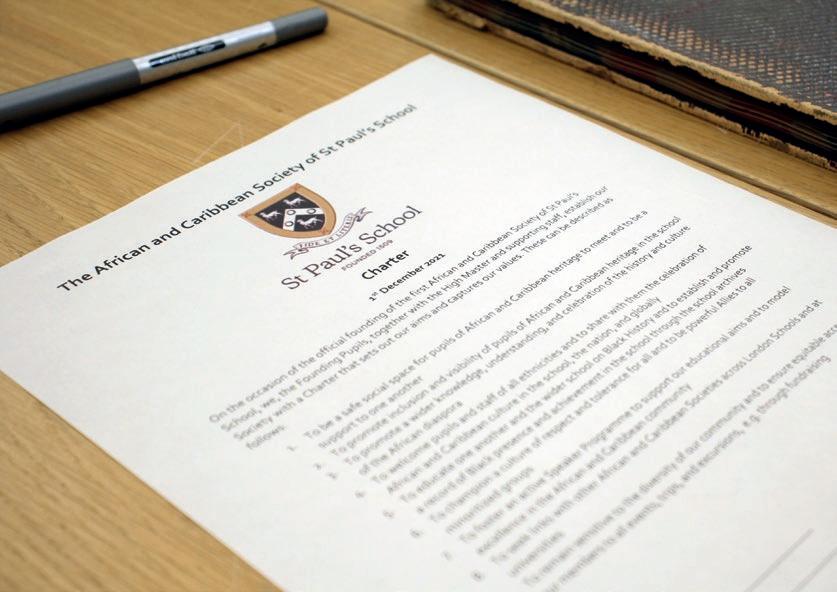
PRESTIGE
LC
Abracadabra! After a two-year hiatus, Prestige, the school’s Magic Society, has reappeared and returned to action this academic year. With the COVID-19 pandemic receding and a relaxation of restrictions, it has been a source of great satisfaction to be able to get back to our regular meetings on Thursday lunchtimes to practise the art of prestidigitation. Fourth Formers Alex Barea and Sam Christie have been enthusiastic regulars, and I for one have picked up a great deal of new material from them. Our practice has involved a variety of routines, being firmly centred on card magic: highlights have included new material such as ‘The Four Appearing Aces’, ‘Pick a Card, Any Card’, and ‘Any Card at Any Number’, but also classic favourites such as ‘The Ambitious Card’, ‘Three Card Monte’, and ‘This, That, and the Other’. Regrettably we have not managed to stage any shows this academic year (we typically make an appearance at the Christmas and/or Summer Fairs at the Junior and Senior Schools): this now remains a firm aim for next year! ❚
FORMULA ONE SOCIETY
Thomas Lamont
Formula One Society was a new society this year, and one I am very happy to have created. We’ve explored F1 across technological, psychological, and open discussion forums so far.
Perhaps the most intriguing storyline we had over last season was Hamilton vs Verstappen, a topic hotly discussed since we began the society at the beginning of the term. This battle culminated in the Abu Dhabi Grand Prix, where we luckily had a meeting the day after. This meeting of the society was the most enjoyable all year, as our normal open discussion forum was taken advantage of by both Hamilton and Verstappen supporters, some hotly denying that Verstappen deserved the title. This open discussion forum is one of the most exciting things about the society, contributing to both better discussions and understanding of the sport. This year of Formula One Society has been extremely enjoyable and I expect (and hope) the next one will also show the debating skills of our members. ❚
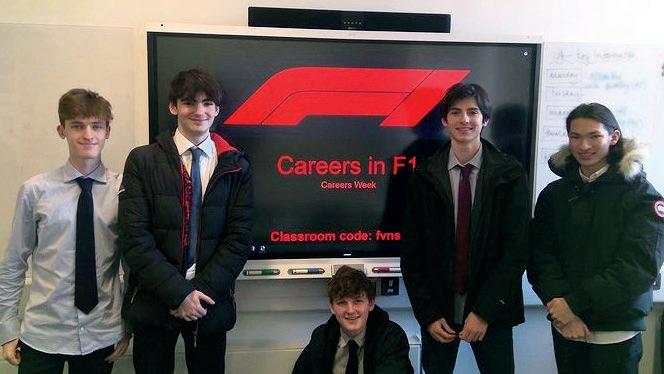
JUNIOR POLITICS SOCIETY
Orko Lahiri
It would be an exaggeration to say that Junior Politics has completely changed my outlook on politics and day to day life. That would be nonsense. However, I have learnt a lot, and my opinions have changed across the last year, partly thanks to Junior Pol Soc. A large number of the presentations have been by people in my class, and that would be due to Mr Nilsson. It’s thanks to him and his weekly reminders that I and many others joined Junior Politics Society. I, among others, am very grateful for this, as otherwise I would probably not have found out about it or attended. I remember talking to one of my friends after he did a presentation, and he said something along the lines of how he actually enjoyed it, and thought that ‘everybody should do a presentation: they should get to feel the joy of doing it.’ I agreed with him, as I had done my first presentation, and had felt the weight lifting off of my shoulders after completing it, but after I did the second one, I realised that that feeling wasn’t quite the same. The joyous feeling is much more gratifying. ❚
The Zelensky Presentation
Ishaan Moorthy
One of the best talks at Junior Politics this year was a brilliant presentation on Volodymyr Zelensky. The presentation gave insights into the origins of Zelensky and how the comedian became a statesman. It also showed how he went from a seemingly less effective leader to one of the most powerful and charismatic of those currently in power. The presentation compared past works of Zelensky to his current regular briefings on the war, outlining how his message, setting, and even attire put his message forward and helped him to inspire his citizens and the rest of the world. The presentation gave many other details, even reflecting on Zelensky’s previous acting role as a president of Ukraine with his current role. Overall, I thoroughly enjoyed it and learned many things. This was just one of the many brilliant presentations that we have seen in Jr Politics Society including one on Swiss neutrality, the history of the Kashmir conflict, and diversity in the media. I am looking forward to many more. ❚
TRO
The Chemistry Senior Projects Club was back with a (mainly metaphorical) bang this year after a 12 month hiatus due to COVID.
Run for the Upper Eighth in the Autumn Term to allow them to experience practical techniques and reactions not usually seen in school chemistry, which they missed out on last year, the club proved to be very popular. During the Spring Term the club was opened up to pupils in the Lower Eighth and they largely followed the same programme as the Upper Eighth the previous term. During the second half of the term the same programme was offered as outreach to our partnership schools on Saturday mornings, with Lower Eighth form pupils acting as demonstrators.
The partnership pupils enjoyed the programme, with some great feedback being received, and a number of them were enthused about the prospect of studying chemistry-related courses at university. The final practical saw the students carrying out a chemiluminescence reaction on a fluorophore synthesised during a previous session – in layman’s terms a “glow stick reaction”. As ever, this seemingly magical bit of chemistry proved to be a highlight of the partnership. Many thanks go to all the Paulines who gave up their Saturdays to help, and especially to the chemistry technicians who as always worked very hard behind the scenes. ❚
POLECON
Eli Joseph
Talks this year have included a speech by David Olusoga on Black British history and presentations about the progression of the US supreme court.
The highlight, however, was welcoming former Home Secretary Amber Rudd to speak about her journey in politics: starting off as the MP for Hastings of Rye, she became Secretary of State for Energy and Climate change, and ultimately the Home Secretary. She revealed both what it was like to be a female MP in the Commons, explaining how she had overcome ongoing societal barriers around women in the workplace, and the challenges of rising through the ranks in politics. She also mentioned her role in the ‘Remain’ campaign during the time of the Brexit referendum – something she fervently believed in. For her to take a stance and campaign so strongly for the ‘Remain’ lobby was a huge risk for her career, and when the ‘Leave’ campaign prevailed, she worried that her career was over.
There was a clear sense of her moral conviction here, setting an example to us that we should stand up for what we truly believe in, in spite of the possible consequences. Only a year after the Brexit referendum, Mrs Rudd was appointed to the esteemed role of Home Secretary under Theresa May. However, in April 2018 she was forced to resign because of her involvement in the Windrush scandal. After reappointment into Johnson’s cabinet (like a cat with nine lives), her decade-long political career ended over disagreements with the PM on the idea of a no-deal Brexit. Despite the rollercoaster ride of her political career, she spoke fondly of her time in Westminster, and coped impressively with tricky questions given from our St Paul’s community. Mrs Rudd concluded by telling us that a road back to politics was not one she fancied, but she was committed to carrying on her passion for saving the environment. Her political journey was inspiring, since she was only the third female Home Secretary in British political history and had to face a series of divisive issues. Everyone at the talk felt it was a memorable and thought-provoking speech, and the St Paul’s community is very grateful for her giving up her time to come and talk to us. ❚
PUBLIC BENEFIT
